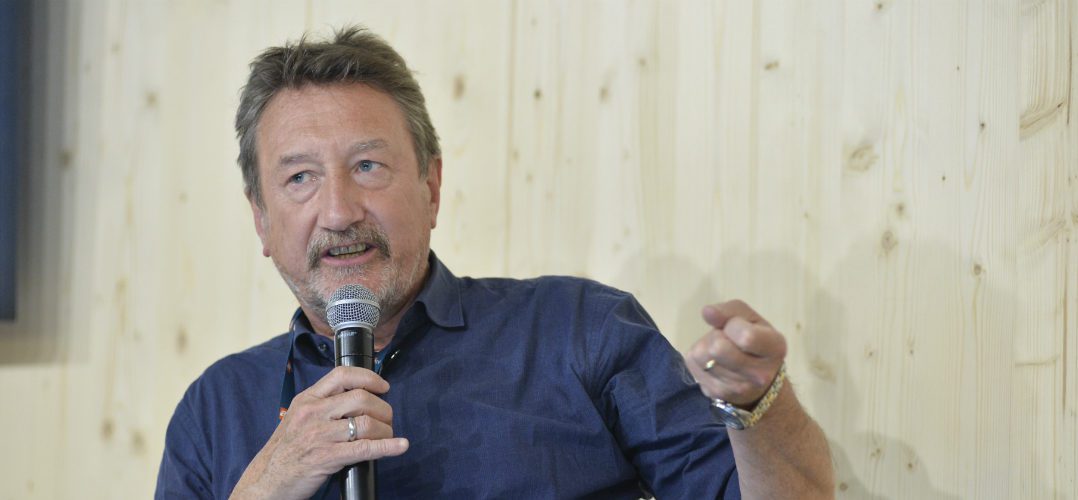Let’s deep-dive into The Swarm! Frank Schätzing’s book is a nearly 900 page tome, published in 2003. It became a bestseller in Germany and internationally… and now it’s going to be a series. In a key session today, Rhonda Richford of The Hollywood Reporter interviewed the minds behind the production: (left to right below) creative director Frank Doelger of Intaglio (perhaps best known as EP and Director of Game of Thrones), ndF CEO Eric Welbers, and Frank Zervos, Senior VP-films and series, ZDF.
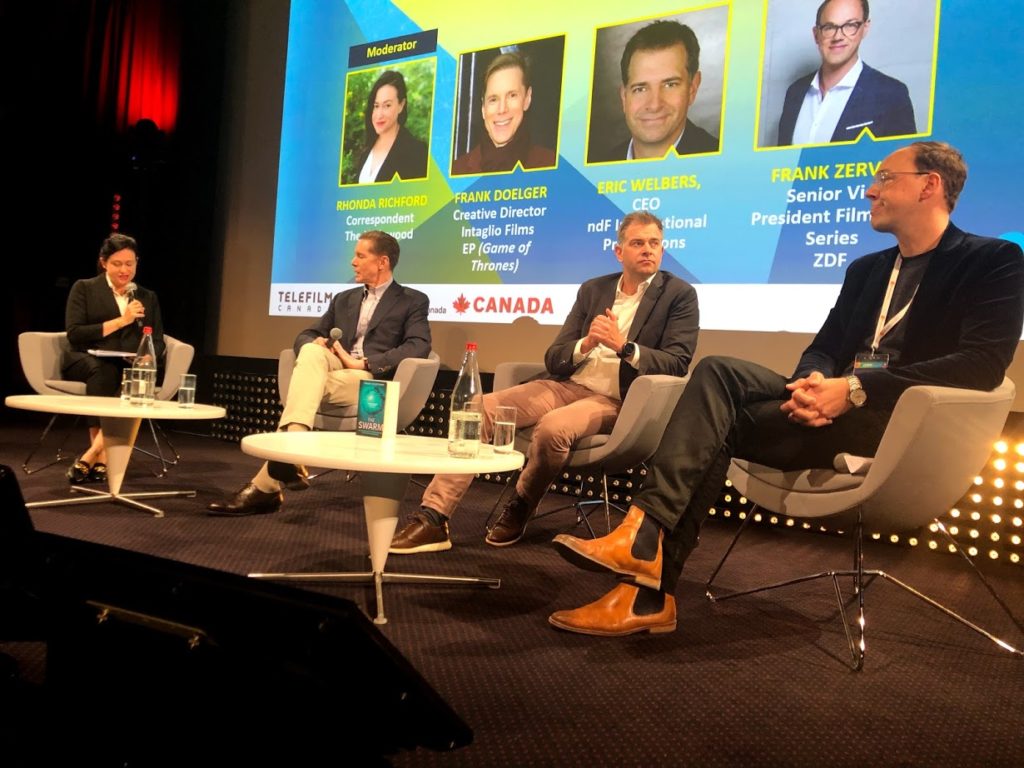
« When Frank Schätzing wrote the novel, one of the big threats was the changing gulf stream, » Doelger said. « The melting of the ice caps or warming of the Arctic wasn’t as much in the news, » but it’s all of a kind: Schätzing’s work is a warning about the impact of human activity on oceans specifically. Terror builds when the ocean’s creatures begin to fight back.
« Everything the creatures use to retaliate against man are things we made, » Doelger went on, describing a scene of a five-star restaurant chef, choosing lobsters for lunch from the fish market. « As he’s putting them into the pot, he thinks one lobster, which feels odd, is looking at him. The lobster explodes in his hand and he becomes poisoned by it. » That becomes a storyline in itself.
« You realise how many times we’ve heard, every summer, about shellfish beds being shut down because of pollutants or toxins. That’s an example of the connection between what we do to the seas and how they fight back, » Doelger said.
Thus The Swarm is timely, and in some ways predictive. Welbers described how ndF scored the rights: « Two years after The Swarm came out, it became a success again when the tsunami happened in Thailand, which was part of the book. The rights were secured immediately after. The way to go at that time was as a feature film, but I think we can be happy it never came together; the book has so much more that can be explored in a series. No broadcaster had the guts to do it. »
Except for the broadcaster that did (when the time was right): ZDF. « We wanted to show the world that Germans can produce English-speaking, high-end drama series. That’s part of our journey, » Zervos explained. « The Swarm is a perfect match to our vision, a true global story with international impact. For decades, German broadcasters and production companies produced at least 95% for the local market; in the last 3 or 4 years, it’s changing. »
Much has to do with how career expectations have changed, he added. « We have talent in Germany – directors, writers, actors – that ask what we’ll produce on an international scale and nationally. We have to think about how we can work with German talent, in Germany, on a foreign and international project like The Swarm. »
Doelger, who worked on both sides of the Atlantic for 20 years, chimed in. « People mistakenly think shooting in English is the answer if you want to make an international co-production for the English market. Talent grew up on local programming; we ingest certain stylistic approaches, certain storytelling approaches. »
He considered it a creative constraint. « It’s exciting to… see how we can take cultural differences that succeeded well locally, and see if we can meld that with things I’ve brought to the table. »
He also revealed how learnings from Game of Thrones impact creative choices. « When I started Game of Thrones nine years ago, one of the most expensive things to do digitally was anything having to do with water, » he said. « There’s so much being done with ‘dry for wet’ – you can shoot in tanks in empty swimming pools and put in the water later. » Also, science and the supernatural must feel as real as possible. « People should feel like this is happening, this will happen, and we have to do something about it. So you have to make it realistic. »
« What I like about the novel is that no one proselytises about environmental damage, » Doelger said as the panel wound down. « It doesn’t need to be discussed; the audience will understand it. » The Swarm is expected to debut in 2020, or the beginning of 2021.
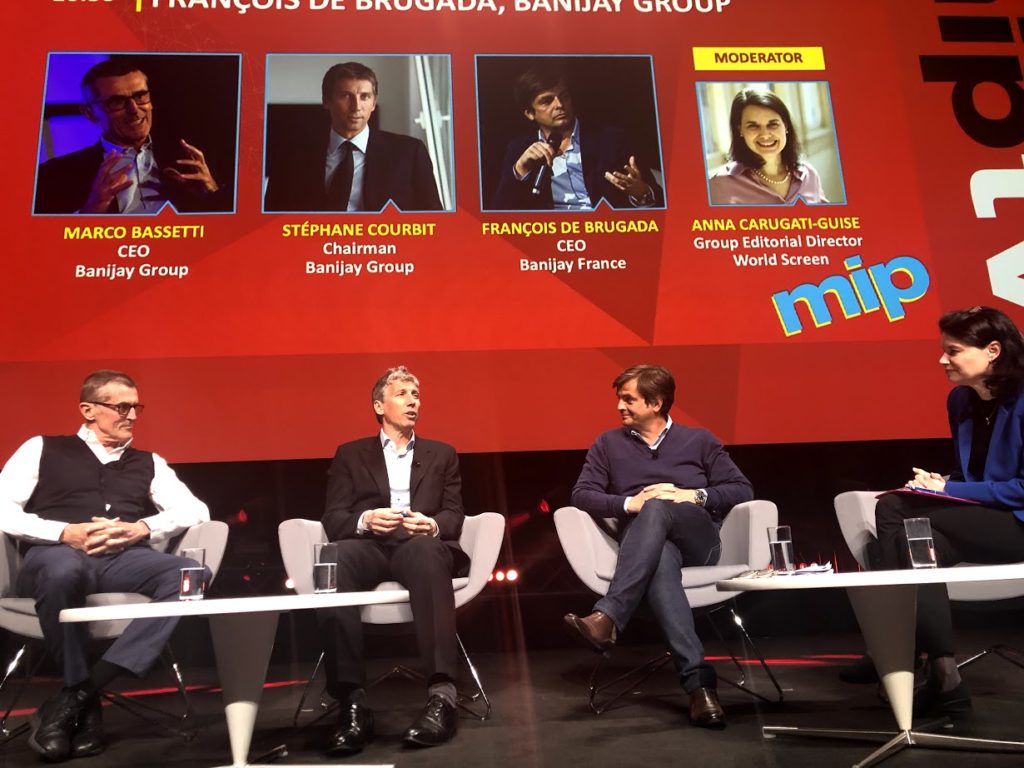
Chairman Stéphane Courbit, CEO Marco Bassetti, and Banijay France CEO François de Brugada of the Gallic-based production and distribution powerhouse shared the stage for a keynote about Banijay’s past, present and future. World Screen Group Editorial Director Anna Carugati-Guise moderated.
« We started 10 years ago, and now produce more than 2000 hours of fresh content yearly, » said de Brugada. « We operate as a people company. It’s not one single entity; we have 5 entities in France, each with its own culture and expertise. That’s why we built success: we can adjust, listen to the market, understand clients’ needs. »
He added that about 35 million French people watch at least one Banijay show per week.
He also tried describing how Banijay’s been so successful at extending the life of formats; Fort Boyard has run for 30 years, not to mention 9 years of Don’t Forget the Lyrics, and 10 Years of Touche Pas à Mon Poste. « Building long-run success needs teams that polish your diamonds daily, » de Brugada said. « From one season to another, each of these shows have transformed; new storytelling, new games. The show is the same but it’s never the same. It’s true for all our shows. »
Asked what Banijay’s hopes are for the future, Bassetti replied, « The English-speaking market are the most attractive; today there’s a lot of appetite for that content. When you launch something in the US or UK, there’s a different type of attraction. »
But while he hopes they will grow in the UK, he also feels growth can be had in Spain and Germany, as well as in Southeast Asia. Meanwhile, Banijay leads in Sweden and France. « Staying a leader today is in some ways more difficult than rising up and becoming a leader somewhere else, » Bassetti observed.
Bassetti also made a big announcement: The sale of a show to ABC in the US, for primetime. « It’s a physical and mental game show with a family of four, and it’s called Don’t. It means don’t leap, don’t cry, don’t laugh, don’t speak, whatever. We don’t know yet when we’ll be on air but it’s going to be a big format. »
Asked whether scale is always a good thing, Bassetti had thoughts about that, too.
« Scale is always good. If scale means you create more bureaucracy–more control, less autonomy, that’s not good. But today scale is important. Scale attracts talent. With scale you have leverage. And you can keep IP. »
As a bonus question, Carugati-Guise asked about rumours that Banijay may purchase Endemol Shine.
Courbit, who’d been relatively quiet, replied. « We have nothing to say, so I’m sorry. »
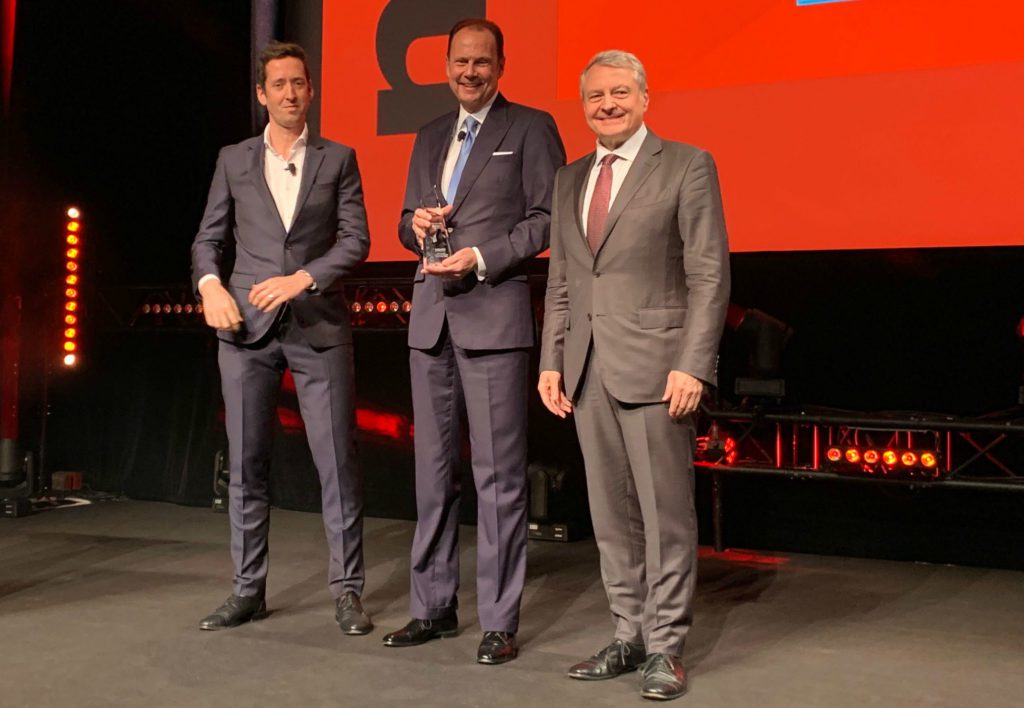
Clarke finished off by asking about ongoing rumours of a CBS / Viacom merger. Could those two businesses become one? “They were once, » pointed out Nuñez. « Could they? Possibly. That’s not my call. From my perspective I am looking for ways to grow and expand our international footprint. From a bigger corporate M&A perspective, that’s for the board! »
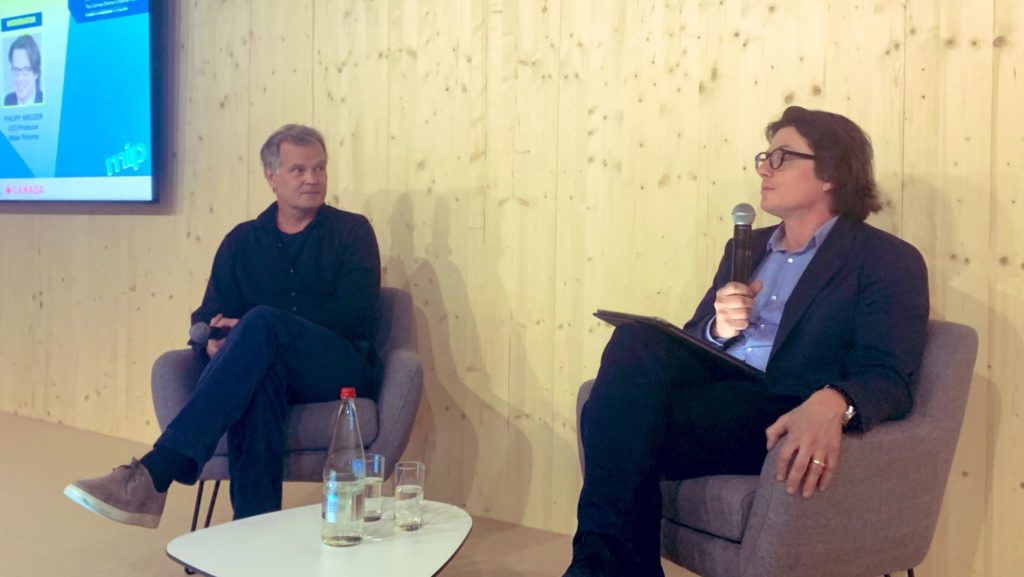
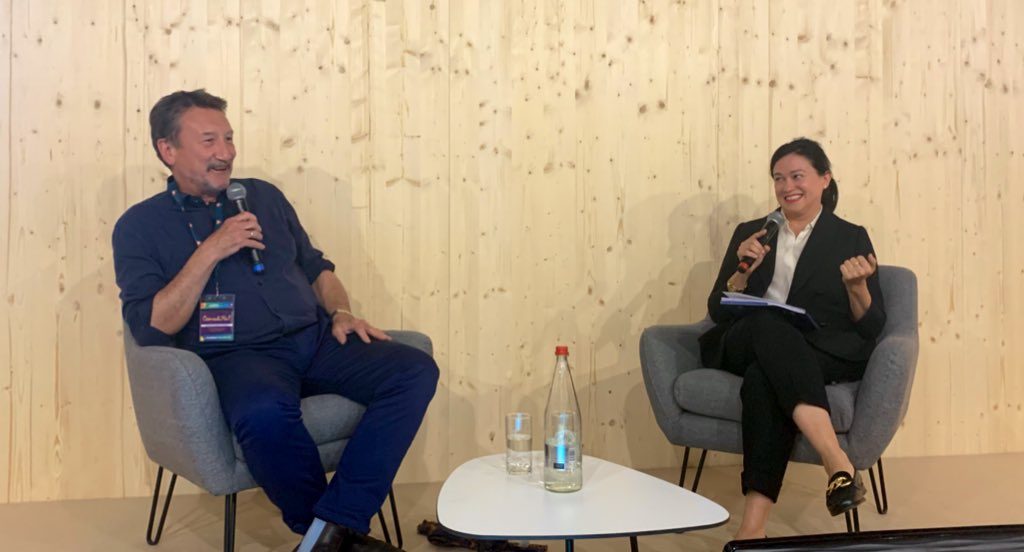
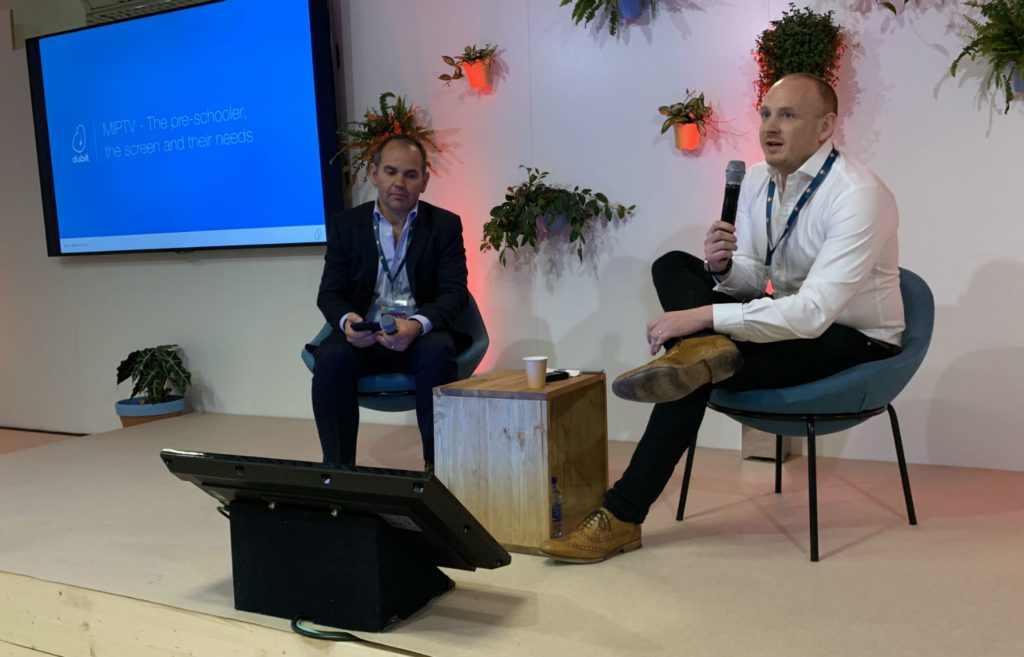
Earlier in the afternoon, UK-based research company Dubit presented some of its latest data on what pre-schoolers are doing with screens, and what their entertainment needs are. Global head of research Peter Robinson and SVP of media insights Adam Woodgate were supplying the data.
“Media has fragmented massively, and you can find content pretty much everywhere,” said Robinson. “They’re using YouTube to find micro-niche content, Netflix is curating content for them based on their interests… so each bit of content has a smaller audience.”
He noted that from around six or seven years old, children trust friends and YouTubers as much as parents when it comes to finding new content. Robinson also talked about attention spans. « The goldfish memory is supposed to be eight or nine seconds. A child’s attention span is supposed to be seven seconds. That’s really important for how you present content to kids, » he said. Unless content is super-engaging very quickly, they’ll move on to something else.
Discovery remains a challenge, even for device-savvy kids. “Kids and parents, actually, while they have lots and lots of content to find, they find it hard to find new stuff,” said Robinson. “What parents need and children need is really clear curation… When we talk to kids and parents, the best way to do that is through having a curator who loves and cares for the content.”
The session also touched on emerging technology like voice control, smart assistants (like Alexa, Google Assistant and Siri) and smart speakers. “We think voice is really, really interesting. It’s that one control-form that has the ability to be continuous across all the different platforms… once kids and parents have learned the rules to that, it has the potential to be that one thing that allows kids to get to content very, very easily. »
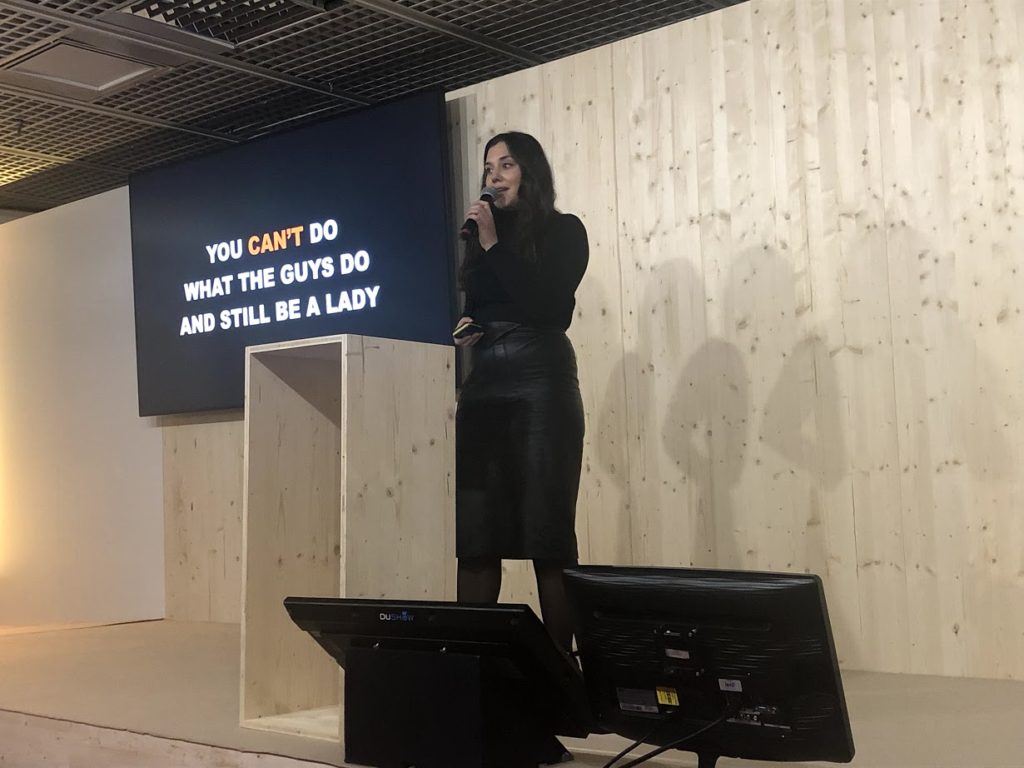
Oh, my pitch! The In Development Drama Writers Pitch featured projects from emerging and seasoned writers with international ambitions, and this afternoon we got to see who’s in the running. Check them out below.
The Tribe was presented by creator Agata Koschmieder (shown above). It opens in Warsaw, 1918, where we meet Sonia, who grows up in a brothel with her sisters and mother. The latter dies, leaving them with a strange revelation: To make ends meet, she dabbled in drug dealing. Sonia takes up her mother’s mantle, selling morphine in a freshly liberated Poland.
Citing the phrase « You can’t do what the guys do and still be a lady, » Koschmieder rejoindered, « What if I don’t want to be a lady? This is why I created The Tribe–to give women the right to commit crimes, take power, be real gangsters in a man’s world. »
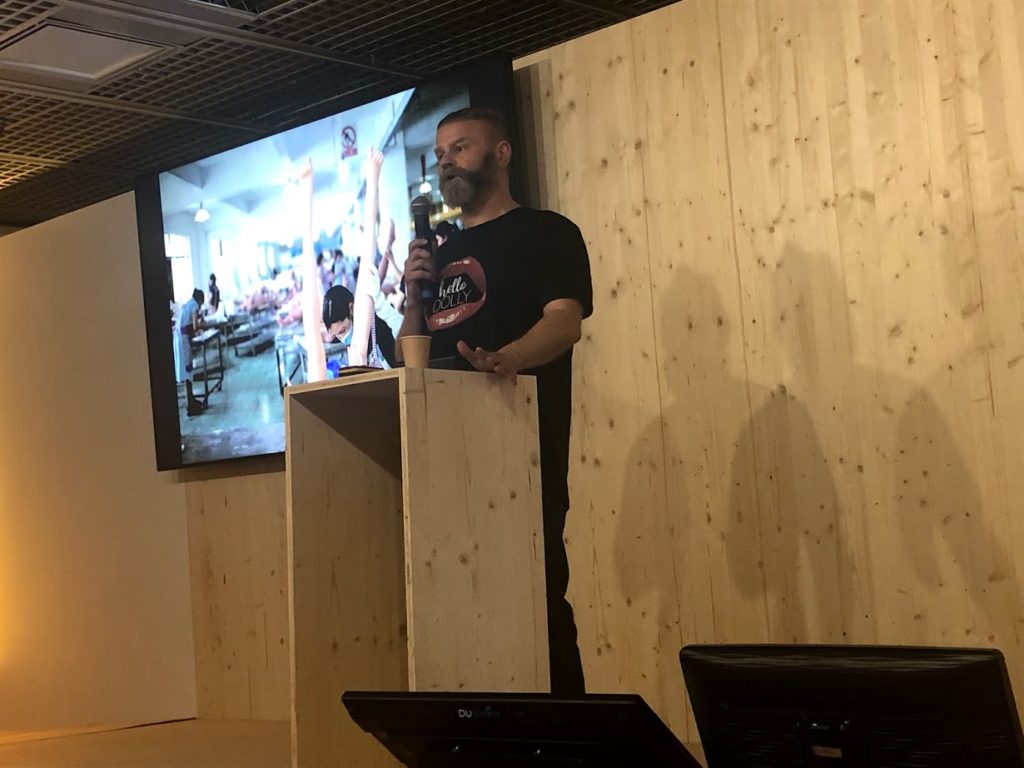
Johnny Maginn presented Hello Dolly. Set in a sex doll factory in Dover, England, it deals with the desires, hopes, perversions and prospects of those working inside. At centre is our hero, master doll spraypainter Christie Moon.
Hello Dolly hides a message about capitalism and desperation in its improbable latex package. Of his protagonist, Maginn said, « No matter how hard he works, he can’t afford to live. This injustice burns Christie. When he’s asked to make a gold vagina for a Far East president whose population is starving, something inside him snaps. »
Maginn feels the show will speak to those left behind by a world interested only in growth at the expense of invisible others. « There’s a hungry audience of millennials, Brexiteers, and Gilet Jaunes that demand their story be heard. »
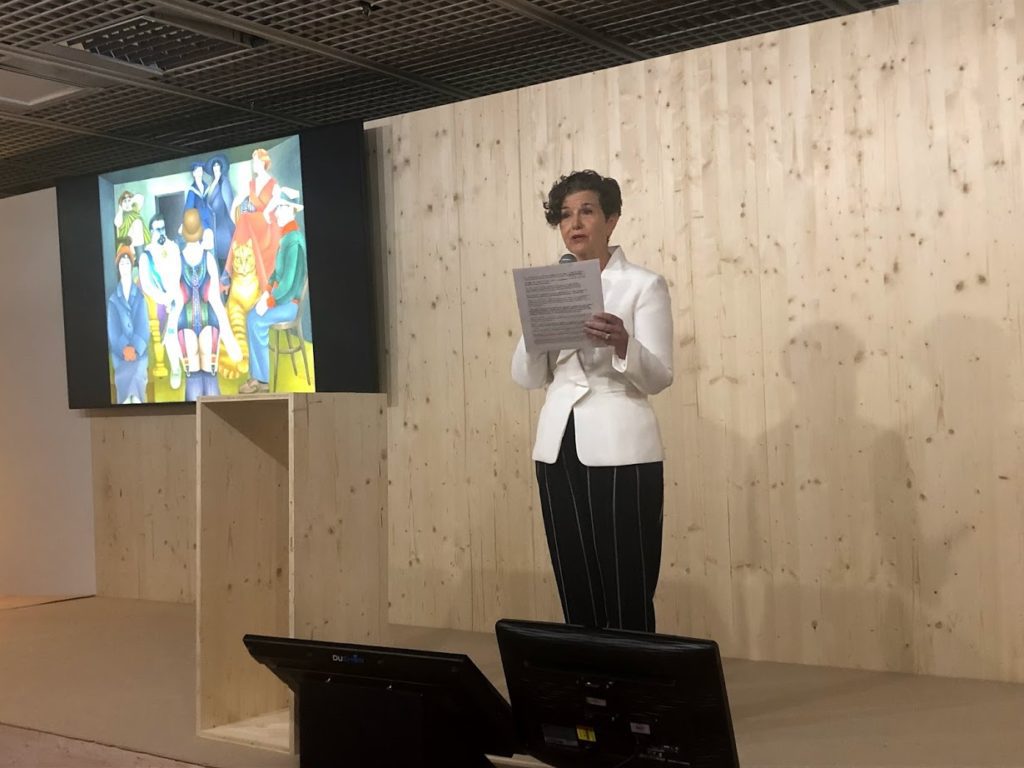
Rachel Feldman, creator of Kinks, calls her show « a psycho-sexual circus filled with topics some consider taboo. » It follows Dr. Erica Novak, a sex therapist and « post-#MeToo heroine » with aspects of Audrey Hepburn.
The secrets of Dr. Novak’s personal life will intersect with the issues, obsessions and, well, kinks her patients face. Dr. Novak’s biggest obstacles will be patriarchal symbols–including her father, and law enforcement.
If that sounds pretty kinky, fear not. « Everything I write is a romance in disguise, » she added.
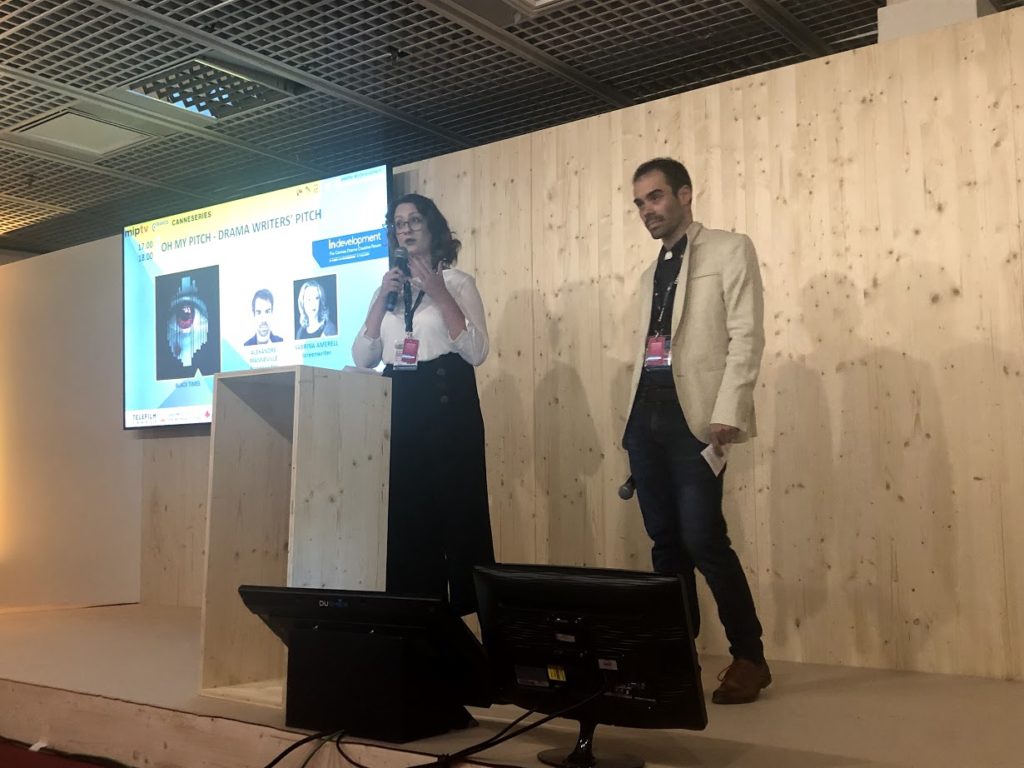
Last up, Sabrina Amerell and Alexandre Manneville presented Black Times, which takes place in 1347 Europe, plaguetime. It follows a doctor, teenage witch (or not?), priest, merchant, and mercenary.
In essence, the fight to survive pushes these fragmented believers in science, religion, money and magic to the extremes of their ideologies. Will they lose their souls?
« Sometimes survival requires faith, especially when you’re a young girl growing up in a man’s world, » said Amerell.
« We are all believers in man, God, science, money, war, » said Manneville. « We think we left the Black Times, but we never did. Just open your eyes; you’re in them. »
Additional reporting by Angela Natividad and James Martin

